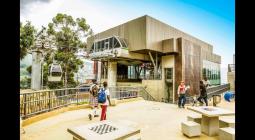Madagascar inaugurates the Tananarivo cable car: an ecological and urban leap forward
On 21 June 2024, Madagascan President Andry Rajoelina inaugurated the first section of the Antananarivo cable car, marking a crucial milestone in the history of urban transport in the capital. This ambitious project aims to reduce traffic congestion and offer an environmentally-friendly alternative to traditional transport.
The Antananarivo cable car, capable of carrying up to 75,000 passengers a day, is an innovative solution for relieving congestion in a city originally designed for 300,000 inhabitants, but which now has more than 3 million. President Rajoelina, accompanied by several Malagasy and French officials, flew over the city centre in this new means of transport, demonstrating its efficiency and safety.
Ecological benefits
This cable car represents a significant gain for the environment. “Taking 75,000 passengers off the bus and 2,000 cars off the road in Tana is already a great deal in terms of carbon savings and, above all, travel”, explained Gérard Andriamanohisoa, Madagascar’s Secretary of State for New Towns and Housing. Reducing the number of vehicles on the roads will help to cut CO2 emissions, thereby improving air quality in the capital.
Two French companies, Poma and Colas, carried out the 12 km project, with the highest point over 50 metres high. Safety tests were carried out for several weeks before the lift opened to the public. “We’re testing the brakes, and we have a lot of sensors in the stations and on the line, to detect any problems before they happen, so we can stop the lift and make sure there’s no risk to passengers,” explains Guillaume Rannaz, Technical Manager at Poma.
The project, which cost a whopping €152 million to build, was financed mainly by a bank loan guaranteed by the Banque Publique d’Investissement. A further 28 million euros of this funding was covered by a loan from the French Treasury.
Despite its many advantages, the cable car remains inaccessible to a large proportion of the population because of its cost. A ticket costs 4,000 ariarys (around 80 euro cents), six times the price of a bus ticket. With a minimum wage of around 50 euros a month, many Tananarivians will not be able to afford this means of transport. However, social fares are available for students and pensioners.
Cover photo: By Boris Ngounou




